Best budget binoculars 2024: Cheap but high-quality models
The best budget binoculars on the market offer great quality at prices that won't break the bank. We've included models useful for stargazing, nature-watching, and more.

1. The list in brief ↴
2. Best overall
3. Best for detail
4. Best for stargazing
5. Best for portability
6. Best for young observers
7. Best for newcomers
8. Best for adventurers
9. Best lightweight durable pair
10. Best budget binoculars FAQ
11. How we test
Purchasing a pair of the best budget binoculars can be a sensible decision if you have a small budget. Good quality binoculars don't have to cost the earth, and we've rounded up a great list of recommendations all costing less than $200. Some pairs on this list cost as little as $40, offering a great way to stargaze or nature-watch without breaking the bank.
The binoculars featured on this list can be used to observe the night sky, watch wildlife, or observe sporting events. Each pair has been assessed on its build quality, comfort, versatility for multi-purpose use, and, perhaps most importantly, the quality of the views it offers.
You'll also find that these best budget binoculars are great starting binoculars, too. If you're a new user, picking up a cheaper pair can be a good way to see how the hobby feels to you, and if you see yourself being a regular user of binoculars. If you do, then you can pick up a more powerful pair later down the line — our roundup of the best binoculars across all price points can help with that.
For something a little smaller we've also tested and ranked the best compact binoculars. If binoculars aren't quite right for you and want something solely suited to stargazing, give our best telescopes guide a read.
The quick list
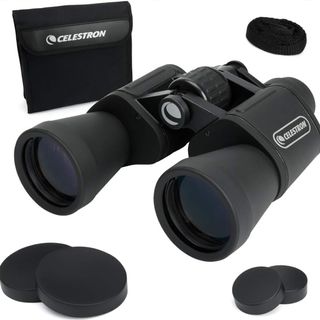
A great value pair of entry-level binoculars from a trusted brand. Good for all-round use and for occasional skywatching sessions.
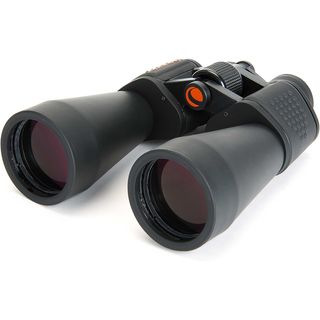
A large pair of binos that are suitable for enjoyable astronomy when combined with a tripod. They are a quality pair that are easy to adjust and focus.
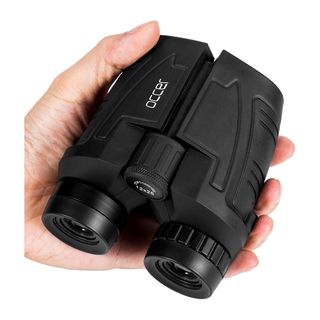
This palm-sized pair offer surprisingly pleasing image given their low price point and pocketable design.
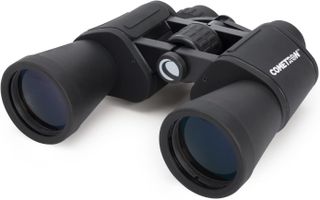
You won't find 'good' full-sized binoculars for much less than this — a perfectly good pair for getting closer to the action, if that's all you need to do.
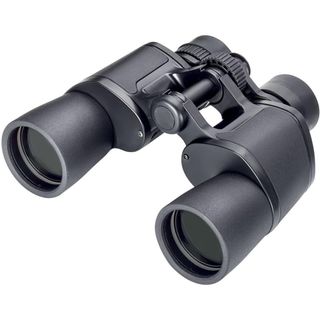
Great value binoculars with top-quality glass. Their rubber-like armor makes them ideal for children to use worry-free too.
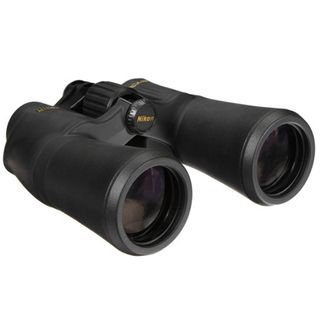
The Nikon 10x50 Aculon A211 binoculars are sleek, well made and offer great value optics in a wide field of view.
Load the next 2 products ↴
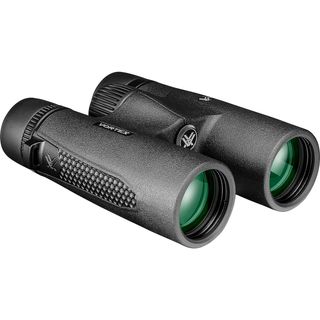
Waterproof, shockproof and fogproof — the Vortex Optics Crossfire HD are designed to withstand the highest impacts and inclement weather.
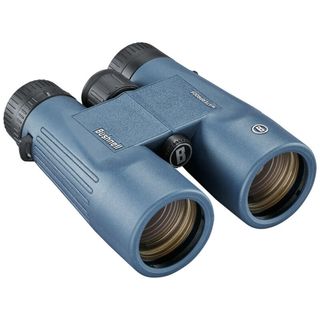
Waterproof, shockproof and fogproof — the Vortex Optics Crossfire HD are designed to withstand the highest impacts and inclement weather.
Best budget binoculars we recommend in 2024
Why you can trust Space.com
Best overall





Specifications
Reasons to buy
Reasons to avoid
✅ You're a beginner astronomer: If you've already owned a pair of binoculars these won't be impressive, but they're great for newcomers.
✅You want to share views: The UpClose G2 are tripod adaptable, lock on to your target and share the view with friends or children.
❌ You want something mainly for astro: If you want something for astronomy specifically, you'll likely want a better quality pair that will give better views.
❌ You wear spectacles: The 12mm eye-relief is not suitable for glasses wearers.
🔎 Celestron UpClose G2 10x50 Binocular: Great for a entry-level pair, they would be a good choice for astronomy groups on a budget ★★★★½
The Celestron UpClose G2 10x50 binoculars are the overall best budget binoculars — but even without their low price tag we think these are fantastic binoculars, period. Their 10x magnification is excellent, and their wide field of view with a 50mm diameter makes for ideal skywatching.
In our Celestron UpClose G2 10x50 binoculars review, we called them the "perfect entry-level product", and said you'd struggle to find a comparable pair in the same price bracket. Because of their low price, we'd recommend them if you're a newcomer to astronomy and want to try out if viewing the night sky with binoculars is for you. But despite being from Celestron — a leading brand in astronomy products — you can use these binoculars for a wide range of other purposes, too.
There is one downside, though: the build quality of the UpClose G2 binoculars is very average at best. These aren't binoculars that are going to last a long time, so if you're wanting something hard-wearing with longevity you're going to have to look elsewhere.
But for a beginner's pair, or something to last a couple of years, we can't recommend these highly enough. Build quality aside, they offer fantastic views, especially of the night sky. Coming from Celestron, that's to be expected.
- Read our full Celestron UpClose G2 10x50 review
| Attributes | Notes |
|---|---|
| Design | Basic no-frills design |
| Performance | A pleasingly low amount of chromatic aberration |
| Functionality | A good entry-level pair for general use |
Best for detail






Specifications
Reasons to buy
Reasons to avoid
✅ You want to stargaze with them: The huge aperture drinks in loads of light and can be used for deep sky astronomy.
✅ You wear spectacles: The generous 17mm eye relief is comfortable for glasses wearers.
❌ You don't want to buy a tripod: The 12x magnification will also magnify any wobble by that amount, you'll need a tripod to enjoy still views.
❌ You want something lightweight: These binos are huge and weigh over 2.2 lb / 1kg.
🔎 Celestron SkyMaster 12x60 Binocular: A great value pair of astronomy-friendly binoculars. The tripod adapter is especially welcome given the high magnification. ★★★★½
We've got another set of stargazing binoculars here from Celestron, with the SkyMaster 12x60 binoculars. There's one big difference here, though: they also sport a fantastic build quality and a premium feel. If you're looking for some binoculars on a budget to view deep-sky objects like the Andromeda Galaxy, you can't do much better than the Celestron Skymaster 12x60 binoculars.
These particular binos sport a Porro Prism design, have multi-coated optics and objective lenses of 60mm. Their glass is the superior BaK-4 as opposed to BK7, which is a huge plus given the price point here. With a 12x magnification, you'll find this pair a perfect way to view the craters of the moon and spot individual stars.
There is a downside to having such a large magnification: It's very hard to hold the binoculars still enough to avoid any wobble, which can make for a frustrating viewing experience. Thankfully, there's a tripod mount on the Skymaster 12x60s, so attaching them to a tripod (which you'll need to be separately) is a cinch — and will make for much steadier, pleasant viewing. We also find that using a tripod makes sharing views much easier: if you're skywatching in a group, once your celestial target has been focused on, everyone can take a look without needing to readjust every time.
Underlining the premium build quality is a non-slip rubber cover, enhanced by textured pimples for added grip (handy if you use them without a tripod). The rubber makes them water resistant but not waterproof or nitrogen purged, although we didn't experience fogging during our hands-on Celestron SkyMaster 12x60 review. They come with lens caps and a simple carry case to aid portability.
- Read our full Celestron SkyMaster 12x60 binocular review
| Attributes | Notes |
|---|---|
| Design | Excellent build quality |
| Performance | Suitable for astronomy |
| Functionality | Generous 17mm eye relief, tripod mount |
Best for stargazing





Specifications
Reasons to buy
Reasons to avoid
✅ You're on a tight budget: For a full-sized pair of binos, you won't find much cheaper than this pair.
✅ You don't need anything fancy: These binos will get you closer to the action; if that is all you need them for, they are a perfectly reasonable option.
❌ You want the best quality glass: This pair uses the inferior BK7 glass that means the edges will appear more blurred than if BaK-4 glass was used, though for the price, we can't complain.
❌ You will use them around water: They are water resistant, so fine in light rain, but nothing more.
🔎 Celestron Cometron 7x50 Binocular: If you are looking for a very inexpensive way to enjoy skywatching, you can't argue with the Celestron's Cometron 7x50. ★★★★
In our Celestron Cometron 7x50 review, we called these binoculars 'remarkable value for money'. It's two years since our review, but we still stand by that — and there's been little movement in the market that makes these binos any less of a bargain.
The Celestron Cometron 7x50 binoculars have large 50mm objective lenses and sport a 7x magnification. Granted, it's not the largest magnification on this list, but it's large enough to provide excellent views of wildlife and events — even for stargazing, it's a fantastic introduction. The benefit of these binoculars not being too overpowered is that you won't need a tripod to get steady, wobble-free views, either.
The Celestron Cometron 7x50 binoculars have a Porro Prism design, which is perfect for astronomy — although you can, of course, use these binos in the daytime too, whether you're spotting wildlife or getting closer to sporting action.
The downside is that the Cometron binoculars use BK7 glass rather than the superior BaK-4. This is not surprising given the budget price point, but it does mean you might get a slightly fuzzier edge on your images rather than a perfectly shaped disk of light.
Still, the glass is multicoated, offering reductions in reflections and sharp images, and the binoculars are water-resistant, which will protect them against the odd splash or light rainfall. (We should note that they are not waterproof, however, so we wouldn't recommend using these near a body of water where they might fall in).
Overall, the Celestron Cometron 7x50 binoculars aren't perfect, but their price point makes them the ideal budget pair, whether you're a beginner or just watching the purse strings.
- Read our full Celestron Cometron 7x50 review
| Attributes | Notes |
|---|---|
| Design | Basic, porro-prism |
| Performance | Good for celestial and terrestrial viewing |
| Functionality | Wide FOV, short eye-relief |
Best for portability






Specifications
Reasons to buy
Reasons to avoid
✅ You want a pocketable pair: This pair weighs only 249g and fits perfectly in your hand, making them easy to carry on walks, to sporting events, and to concerts, so you never miss a moment.
✅ You want a wide field of view: Great for covering large areas such as fields or savannas.
❌ You need something waterproof: These binoculars are fine for use in light showers but not for heavier rain.
❌You want something for astro: The 25mm objective lens diameter is half what we'd recommend for astronomy.
🔎 Occer 12x25 compact binoculars: Ideal for keeping in your pocket day-to-day. They're surprisingly good quality and provide great views given the low price. ★★★½
For beginners who care about portability, the Occer 12x25 binoculars are a great choice. Without breaking the bank, they offer a high-quality experience and will hardly take up any space. They're perfect for traveling with or simply slipping in your bag when you're out and about.
The Occer 12x25 binoculars sport high-quality BaK-4 multi-coated lenses, which give users sharp images and beautiful, accurate colors. In our Occer 12x25 compact binoculars review we praised their image quality: Notably, they had less chromatic aberration (i.e. color fringing) than the Celestron Outland X 10x42 which are almost double the price.
The Occer 12x25 binoculars are great to hold, too, thanks to their non-slip rubber coating. They're comfortable to grip, even for larger hands, which is great given their small size.
We've found the focus wheel, neatly in the center of the Occer 12x25 binoculars to be very easy to use. Focusing is a breeze, and we've been able to find our target quickly and comfortably. The eye cups are very comfortable — they're made of soft rubber and are foldable, allowing you to adjust them to your needs or preferences.
Adding extra value, you'll get a neck strap bundled with the Occer 12x25 binoculars. As basic as it sounds, it's a very useful addition that protects them when in use, stopping accidental drops. There's also a carry pouch to keep them safe when they're not in use, but we should note that there are no lens caps included.
- Read our full Occer 12x25 compact binoculars review
| Attributes | Notes |
|---|---|
| Design | Lots of grip, portable |
| Performance | Bright and colorful views, minimal chromatic aberration |
| Functionality | Wide FOV, pocketable |
Best for young observers



Specifications
Reasons to buy
Reasons to avoid
✅ You want top-quality glass: They utilize top-quality BaK-4 glass that is fully multi-coated.
✅ You wear spectacles: These binos have a generous 18mm eye relief, allowing glasses wearers to enjoy the entire field of view.
❌ You want something to use in your garden: The close 5m focus is below par for backyard bird and bug watching.
❌ You want the 'wow' factor: Though there's nothing particularly 'wrong' with them, they are an average pair of binos.
🔎 Opticron Adventurer T WP 8x42: A good choice as a general-purpose binocular, and perform well for astronomy ★★★
We've chosen the Opticron Adventurer T WP 8x42 binoculars specifically as the best budget binoculars for younger users. Normally, we'd recommend the 10x50 alternatives, but the 8x42 specification makes these binos lighter and smaller while still providing great magnification and a good amount of light-gathering power.
That's not to say they're not worth purchasing if you're an adult: No matter your age, this is a solid pair of binoculars that makes a great starting point if you're on a budget. In our Opticron Adventurer T WP 8x42 review we praised their value for money, whether you're using these binoculars for spotting wildlife or observing the night sky.
Given the price point of the Opticron Adventurer binos, they have some great specifications. They have a Porro prism design, high-quality BaK-4 glass, and fully multi-coated lenses. Even better, they're waterproof, resistant to dew, and wrapped with protective rubber armor — perfect for children who are prone to dropping and knocking them. They also come with a neck strap, lens covers, and a carrying case to keep them safe when they're not in use.
These binoculars are a particularly good choice for astronomy, although they're versatile enough to be used in the daytime, too. Given their price and wealth of features, they're a great choice for children — but also great for adult beginners on a budget.
- Read our full Opticron Adventurer T WP 8x42 review
| Attributes | Notes |
|---|---|
| Design | Durable coating |
| Performance | Good for astronomy, not great for nearby subjects |
| Functionality | Narrow FOV, long eye-relief |
Best for newcomers






Specifications
Reasons to buy
Reasons to avoid
✅ You want an affordable means of stargazing: If you want to get a closer look at the night sky from home without breaking the bank, these will serve you well.
✅ You want to share views: They are tripod adaptable so more than one person can see the same view without re-finding and focusing.
❌ You wear glasses: The eye relief is just 11.8mm so glasses wearers would really struggle to see the entire field of view.
❌ There's very limited space in your backpack: The porro prism design takes up more room than a roof prism pair.
🔎 Nikon 10x50 Aculon A211: These are a good option if you're just looking for a basic pair of binoculars that you won't expect too much from ★★★
While there are one or two downsides, the Nikon Aculon A211 offers fantastic value, and we think they'd make excellent binoculars for a beginner. Their 10x magnification is ideal for astronomy (as long as you can keep them stable), and with excellent performance, they provide some great views of the night sky.
If you're a regular user of binoculars, you'll likely notice some of the shortfalls of the Nikon Aculon A211s, or at the very least where shortcuts have been made to keep the price down. But if you're fairly new to observing the night sky or wildlife watching through binoculars, you're unlikely to notice. Casual users will find these binoculars to be very comfortable to use, and almost all users will find their views to be pleasing.
Nikon has opted to use top-quality BaK-4 glass in these binos, which is great. The 50mm objective lenses let in a lot of light at night. The 6.5-degree field of view is ideal for observing starfields and nebula, though expect to see some image blur at the outer edge.
If you're planning on taking your binoculars out on hikes, you'll probably want to consider a roof prism pair. This porro prism design, despite being better for creating a brighter image, will take up more room in your backpack.
- Read our full Nikon 10x50 Aculon A211 review
| Attributes | Notes |
|---|---|
| Design | Nicely designed with a few quality shortcuts |
| Performance | Fine if you don't expect too much |
| Functionality | No good for glasses wearers |
Best for adventurers



Vortex Optics Copperhead HD Binoculars
Our expert review:
Specifications
Reasons to buy
Reasons to avoid
✅ You will take them across adventurous terrains: They are designed to withstand the highest impacts
✅ You like getting value for money: Impressive specs coupled with a lifetime warranty is attractive
❌ You don't want to buy from a company associated with hunting: The company's focus is very much on hunting and shooting
❌ You want only the best image: Though we have yet to complete a full review, there have been user reports of blurred edges and some chromatic aberration.
🔎 Vortex Optics Copperhead HD 10x42: Great if you need a rugged and reliable pair out in the field ★★★★
Costing in the region of $150, the specs of the Vortex Optics Copperhead HD binoculars are seriously impressive. They've been designed to be used in the outdoors and have been made to withstand all types of terrains and conditions. If you're the type of person who goes exploring off the beaten path a lot, these binoculars are worth your consideration.
They have tough rubber armor to provide users with a secure and non-slip grip, though should an accident happen, they have been designed to withstand high impact. They are also waterproof (though we can't find their waterproof rating) and nitrogen-purged to prevent fogging. In other words, you can use them in all temperatures without waiting for the lenses to clear.
We've not yet been able to review the Copperhead HD 10x42 binoculars properly, but their 10x magnification combined with a 42mm lens diameter is more than adequate for gazing at the stars. We're not sure we'd call them a dedicated pair of astronomy binoculars, though: More of a solid all-rounder.
So whether you're viewing nature, watching wildlife or gazing at the moon, these binoculars would be a good buy that shouldn't disappoint for their price point.
| Attributes | Notes |
|---|---|
| Design | Roof prism, compact |
| Performance | Good for general observers |
| Functionality | Waterproof, shockproof, nitrogen purged |
Best lightweight durable pair
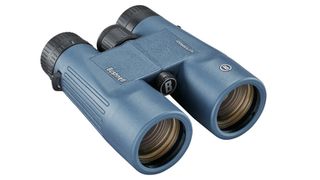
Bushnell H2O 10x42
Our expert review:
Specifications
Reasons to buy
Reasons to avoid
✅ You'll use them around water: Accidents happen, but with the Bushnell H2O range you can rest easy knowing they are IPX7-rated.
✅ You're buying for a child: These binos are very durable and will withstand knocks and drops; they're light, too.
❌ Your main discipline is astrophotography: These are best for terrestrial observing.
❌ You want outstanding image quality: Though durable, the image quality isn't the best; if you're looking for amazing optics, you'll be disappointed.
🔎 Bushnell H2O 10x42 are a lightweight but hardy pair of binoculars that produce good images thanks to the high quality glass and fully-multicoated lenses.
You can really put the Bushnell H2O through its paces if you want to. This hardy pair of binoculars boasts an IPX7 waterproof rating (hence the 'H2O' in its name) and can withstand submersion in water up to one meter deep for up to 30 minutes without getting damaged. You can also rest assured that they'll survive in foggy conditions and harsh weather.
Their lightweight aluminum body makes them light to hold while also giving them highly protective armor, and, coupled with the non-slip rubber texture, they offer a secure grip to their user, too. They're seriously comfortable to hold, and as a result, they are amongst the lightest pairs of binoculars on this list.
But it's not just their comfort and durability that make the Bushnell H2O binoculars stand out. They feature BAK-4 glass, and the lenses are fully multi-coated to enhance the contrast and provide the user with true-to-life color. The minimum focusing distance is 11.18 feet (3.6 m), which might be short enough to use in your backyard to watch birds and bugs, depending on the size of your garden. The image isn't amazing, but 'good enough' for getting closer to the action.
Bushnell believes in this product so much that they offer a 20-year product warranty, where they will repair or replace the binoculars if they should fail.
It's worth pointing out that we've seen these binoculars with a discount of around 50% at special deal events like Amazon Prime Day and Black Friday, so if you're considering buying them it might be worth waiting for a sale.
| Attributes | Notes |
|---|---|
| Design | Porro prism, rugged exterior |
| Performance | Top optics for true-to-color views |
| Functionality | Lightweight, waterproof |
Best budget binoculars Frequently Asked Questions
Which are the best budget binoculars?
We think the Celestron UpClose G2 10x50 binoculars are great for those on a budget; you will struggle to find a different pair that strikes the balance between quality and affordability as these do. Though they don't have the best glass, the large objective lenses and 10x magnification make them a great choice for budding astronomers. They are a perfect entry-level pair from a trusted optics brand.
Who makes the best cheap binoculars?
We think Celestron make the best cheap binoculars because they have such a wide range of binoculars at different price points. That makes it appealing for observers no matter your budget.
What is the best binocular under $200?
If you're happy to spend a bit more we think the Nikon 10x50 Aculon A211 are a fantastic pair of binoculars under $200. However, if you wear eyeglasses then try them out before buying because they don't have a huge amount of eye relief.
What is the best binocular under $100?
We recommend the Celestron UpClose G2 10x50 as the best binocular under $100 and the best budget binocular overall due to their low price, light weight and their surprising stargazing ability.
I struggle to hold binoculars steady, what should I do?
1. Get a comfortable, firm grip on the binoculars
2. Tuck your elbows into your body, preferably against the ribcage or place them on something stationary like a wall or fence.
3. Use a tripod with a binocular mount for prolonged use with heavier binoculars (check the binoculars are tripod-compatible before purchase). On this list, the Celestron UpClose G2 10x50 and the Celestron SkyMaster 12x60 are both tripod compatible.
We also have a full guide on How to Hold Binoculars Steady.
What features should I look for in budget binocular?
A few key features to look for in budget binoculars are:
1. Balance affordability and quality.
2. Magnifications of 7x to 10x are generally the best for skywatching. Objective lenses should be 50mm and larger for astronomy.
3. Porro prisms and BaK-4 glass are best for stargazing.
4. Check binoculars are tripod adaptable if you suffer from shakey views.
5. If you wear spectacles, you'll need something with long eye-relief, 17mm or above.
How we test the best budget binoculars
To guarantee you're getting honest, up-to-date recommendations on the best binoculars for kids to buy here at Space.com we make sure to put every binocular through a rigorous review to fully test each instrument. Each binocular designed for kids is reviewed based on a multitude of aspects, from its construction and design, to how well it functions as an optical instrument and its performance in the field.
Each pair of binoculars is carefully tested by either our expert staff or knowledgeable freelance contributors who know their subject areas in depth. This ensures fair reviewing is backed by personal, hands-on experience with each binocular and is judged based on its price point, class and destined use.
We look at how easy they are to operate, whether eye relief can be adjusted for spectacles wearer if a binocular comes with appropriate accessories or carry bags and also make suggestions if a particular set of binos would benefit from any additional kit to give you the best viewing experience possible.
With complete editorial independence, Space.com are here to ensure you get the best buying advice on binoculars for kids, whether you should purchase an instrument or not, making our buying guides and reviews reliable and transparent.
Join our Space Forums to keep talking space on the latest missions, night sky and more! And if you have a news tip, correction or comment, let us know at: community@space.com.
Get the Space.com Newsletter
Breaking space news, the latest updates on rocket launches, skywatching events and more!

Tantse Walter is a photographer and adventurer that's spent seven years facilitating global adventurous expeditions. She loves getting into the nitty-gritty of sourcing and planning trips. Whether that be for astrophotography location scouting, or just for the love of exploration. Tantse enjoys taking creative, bright and bold photos of people, places, animals and the night sky. Tantse’s photos have been purchased by notable companies such as Ford and Cross Country Trains as well as an upcoming book about the songs, rituals and musical history of Capoeira.
- Kimberley SnaithFreelance contributor
- Keumars Afifi-SabetLive Science Channel Editor, Technology
-
billslugg Powerful (20X, 30X) binoculars are easily put out of alignment by rough handling. Realignment requires some disassembly and adjustment via tiny screws around the mirror assembly. Take a cheap (7x35) pair apart and get to know how its done. Then go find an out-of-collimation powerful pair for pennies and fix it yourself. I got my Celestron 30X100s this way.Reply